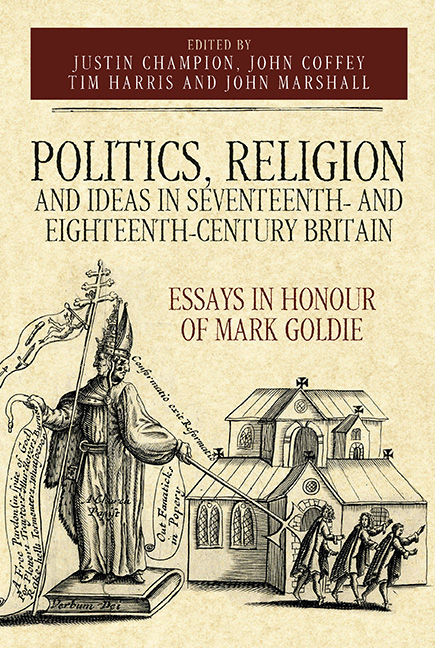 Politics, Religion and Ideas in Seventeenth- and Eighteenth-Century Britain
Politics, Religion and Ideas in Seventeenth- and Eighteenth-Century Britain Book contents
- Frontmatter
- Dedication
- Contents
- Notes on Contributors
- Acknowledgements
- Notes on Text
- Abbreviations
- Introduction: Mark Goldie – An Appreciation
- 1 Constitutional Royalism Reconsidered: Myth or Reality?
- 2 Teaching Political Thought in the Restoration Divinity Faculty: Avant-Garde Episcopacy, the Two Kingdoms and Christian Liberty
- 3 Violence, Protest and Resistance: Marvell and the Experience of Dissent after 1670
- 4 Bulstrode Whitelocke and the Limits of Puritan Politics in Restoration England
- 5 The Assassination of Archbishop Sharp: Religious Violence and Martyrdom in Restoration Scotland
- 6 Compassing Allegiance: Sir George Mackenzie and Restoration Scottish Royalism
- 7 Corruption and Regeneration in the Political Imagination of John Locke
- 8 Locke the Censor, Locke the Anti-Censor
- 9 London, Locke and 1690s Provisions for the Poor in Context: Beggars, Spinners and Slaves
- 10 The Reception of Locke's Politics: Locke in the République des Lettres
- 11 Court Culture and Godly Monarchy: Henry Purcell and Sir Charles Sedley's 1692 Birthday Ode for Mary II
- 12 Thanksgivings and the Signs of the Times: The Apocalypse in the Long Eighteenth Century
- 13 The ‘Secret Reformation‘ and the Origins of the Scottish Catholic Enlightenment
- 14 The Surprising Lineage of Useful Knowledge
- 15 The Vicissitudes of Innovation: Confessional Politics, the State and Philosophy in Early Modern England
- A Bibliography of the Writings of Mark Goldie
- Index
- Studies in Early Modern Cultural, Political and Social History
- Tabula Gratulatoria
3 - Violence, Protest and Resistance: Marvell and the Experience of Dissent after 1670
Published online by Cambridge University Press: 12 October 2019
- Frontmatter
- Dedication
- Contents
- Notes on Contributors
- Acknowledgements
- Notes on Text
- Abbreviations
- Introduction: Mark Goldie – An Appreciation
- 1 Constitutional Royalism Reconsidered: Myth or Reality?
- 2 Teaching Political Thought in the Restoration Divinity Faculty: Avant-Garde Episcopacy, the Two Kingdoms and Christian Liberty
- 3 Violence, Protest and Resistance: Marvell and the Experience of Dissent after 1670
- 4 Bulstrode Whitelocke and the Limits of Puritan Politics in Restoration England
- 5 The Assassination of Archbishop Sharp: Religious Violence and Martyrdom in Restoration Scotland
- 6 Compassing Allegiance: Sir George Mackenzie and Restoration Scottish Royalism
- 7 Corruption and Regeneration in the Political Imagination of John Locke
- 8 Locke the Censor, Locke the Anti-Censor
- 9 London, Locke and 1690s Provisions for the Poor in Context: Beggars, Spinners and Slaves
- 10 The Reception of Locke's Politics: Locke in the République des Lettres
- 11 Court Culture and Godly Monarchy: Henry Purcell and Sir Charles Sedley's 1692 Birthday Ode for Mary II
- 12 Thanksgivings and the Signs of the Times: The Apocalypse in the Long Eighteenth Century
- 13 The ‘Secret Reformation‘ and the Origins of the Scottish Catholic Enlightenment
- 14 The Surprising Lineage of Useful Knowledge
- 15 The Vicissitudes of Innovation: Confessional Politics, the State and Philosophy in Early Modern England
- A Bibliography of the Writings of Mark Goldie
- Index
- Studies in Early Modern Cultural, Political and Social History
- Tabula Gratulatoria
Summary
In late November 1670, Andrew Marvell broke dramatically with his preference for preserving his anonymity in print and in public. Constantly vigilant about being discovered as author of his many verse and prose satires, on this occasion he threw caution aside and stood up in the House of Commons to be a singularly outspoken voice in defence of two dissenting citizens of London: the haberdasher John Jekyll and linen-draper James Hayes. Both men, members of nonconformist congregations, had coordinated resistance to the prelacy of the established Church, embodied in the Conventicle Act (1670), in a crisis of order which might be described as a ‘battle for London’. One such action saw Hayes and Jekyll organise a mass demonstration to hinder the attempt by the magisterial elites of London to snatch the Presbyterian minister Thomas Watson whilst preaching at an illegal conventicle in May of that year. The pair were arrested on 28 May under warrants ‘to search for and secure dangerous and suspected persons’. They sued for habeas corpus, though refused to find securities for a bond of £5,000 binding them to good behaviour and to abstain from attending illegal conventicles. They also had the lord mayor of London Sir Samuel Sterling (or Starling) arrested for making a false arrest, and petitioned to have their case heard before the House of Commons.
Sir John Robinson, the staunchly royalist lieutenant of the Tower, and secretary of state Sir Joseph Williamson, the head of the intelligence service, were outraged at the dissenters’ stance, which had led to the threat of them being called before the Privy Council, and were determined to destroy their petition. Robinson boasted to Williamson that ‘he would attend the Council, make their petition a juggling petition, and give them a broadside’. When the case came before the Commons, Sterling claimed that Hayes had attempted to bribe him not to enforce the Conventicle Act. ‘About a fortnight before the Act against Conventicles’ was due to come into effect, he alleged, ‘Mr Hayes visited him, and told him, that it was the opinion of Counsel that it was but 100l. forfeiture on the Magistrate’ if he failed to enforce the act, and that Hayes would pay him ‘that 100l. and 200l. more, if he would forbear putting the Act in execution’. Sterling rejected the offer and expressed surprise that ‘He … should come to bribe a Magistrate’.
- Type
- Chapter
- Information
- Politics, Religion and Ideas in Seventeenth- and Eighteenth-Century BritainEssays in Honour of Mark Goldie, pp. 59 - 80Publisher: Boydell & BrewerPrint publication year: 2019
